On the 12th December Richard Medhurst offered his opinion in RT News after attending the Assange Extradition Appeal
I’ve been covering Julian Assange’s extradition hearing since 2020. I’ve attended every hearing and ruling. What happened on Friday in the British High Court was a travesty of justice.
To recap where we are in the Assange case:
- January 2021: District Judge Vanessa Baraitser blocked Julian Assange’s extradition from the United Kingdom to the United States on health grounds.
- October 2021: the United States appealed this decision on five grounds.
- December 10, 2021: the High Court ruled in favor of the US, overturning January’s decision, and saying the extradition could go ahead.
I watched Lord Justice Timothy Holroyde read out the ruling on Friday, when I attended the High Court remotely. It was done so casually and quickly – the whole thing lasted barely 10 minutes.
The High Court denied three grounds of the US appeal. It accepted Baraitser’s findings that Assange’s precarious mental state would cause him to take his own life if extradited, making the extradition oppressive. It accepted the medical evidence, despite the US’ attempts to attack the credibility of Prof. Michael Kopelman, the lead medical expert. But it allowed it to go ahead on two grounds: it said it accepted the diplomatic assurances provided by the US, and that the district judge should have notified the US of her provisional view, so as to afford it the opportunity to give these assurances beforehand.
The High Court’s entire decision was based on the assumption that you can trust America’s assurances. You can’t.
When the lead US prosecutor, James Lewis, told the High Court justices that “the United States have never broken a diplomatic assurance, ever”, I guess they decided to believe him. Assange’s lawyers pointed to the case of David Mendoza Herrarte, extradited from Spain to the US in 2009 for drug trafficking. He, too, was given diplomatic assurances by the US, which Lewis said, “are not dished out like Smarties”.
In its ruling on Friday, the High Court judges said they had looked at Mendoza’s case and found the US had not violated its assurances, and that Mendoza’s case did not offer any support to Assange’s claim that US assurances cannot be trusted.
“We take a similar view of two other cases relied on by Mr Assange, namely those of David Mendoza and Abu Hamza [extradited in 2015 from the UK to the US on terrorism charges and sentenced to life in prison without the possibility of parole]. Both can be said to show that the USA may be expected to apply the strict letter of an assurance which it has given, but neither provides any evidence of a failure to comply with an assurance and neither provides any support for Mr Assange’s submission that this court should not regard the offered assurances as reliable.”
It’s astonishing that the High Court justices could reach such a conclusion. I recently published classified documentspertaining to Mendoza’s case. They reveal how the US offered diplomatic assurances for his extradition, only to violate them later. Did the judges see these documents at all? This ruling gives the impression they didn’t.
In Mendoza’s case, Spain placed three conditions on his extradition:
1) He had to serve his sentence in Spain.
2) There should be no life sentence (or similar term of confinement).
3) There should be no “currency-structuring” charge.
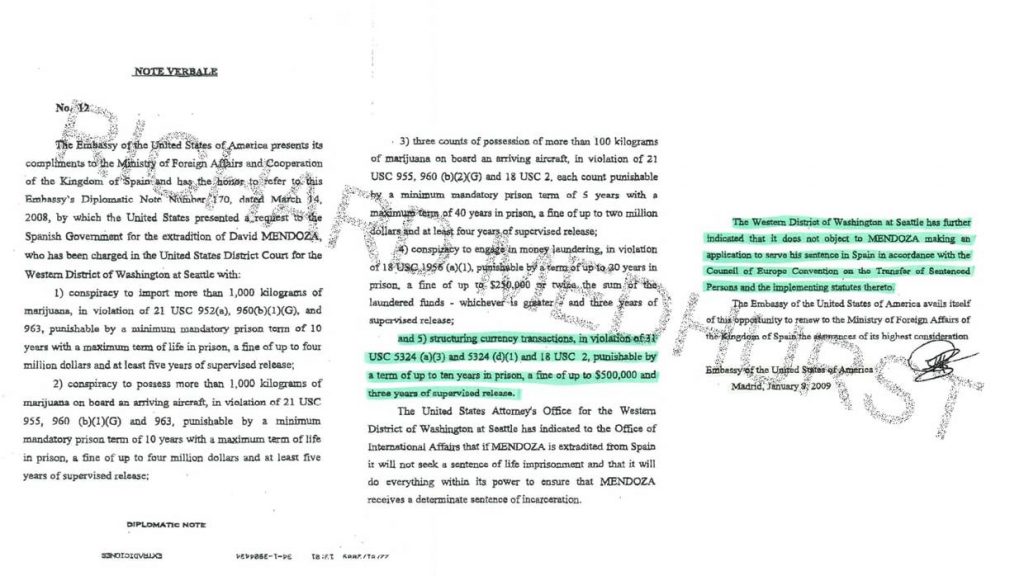
Here’s the diplomatic note sent by the US Embassy in Madrid. It doesn’t actually say the US will allow Mendoza to serve a sentence in Spain – it says the US does not object to Mendoza “making an application to serve his sentence in Spain”, which is completely different. Every prisoner can apply for a treaty transfer anyway – it’s not up to the US.
As for the life sentence, it says the US “will not seek a sentence of life imprisonment”, but that it “will do everything within its power, that Mendoza receives a determinate sentence of incarceration”. That could mean five months, five years, five centuries or any number of years – a practice not unusual in US courts.
It also lists all the charges brought against Mendoza – including the currency-structuring charge, despite this being explicitly ruled out by the Spanish court.
All this is very reminiscent of the assurances for Assange. The wording is equally ambiguous; even if you take these assurances at face value you simply can’t trust them. They allow the United States to subject the WikiLeaks co-founder to so-called special administrative measures (SAMs) or imprison him at ADX Florence supermax prison, a maximum-security facility in Colorado, if “after entry of this assurance, he was to commit any future act that met the test for the imposition of a SAM”.
I spoke to Mendoza, who was imprisoned at Englewood, near ADX Florence, where Assange is likely to be sent. He said that any innocent, random conversation Assange has with his partner or lawyers could be interpreted by the US authorities as some sort of “code”, and used as a pretext to lock him up immediately under SAMs in some other hellhole – that’s if they don’t do it the moment he sets foot in the US.
Alternatively, they could also place Assange in a communications management unit (CMU) or special housing unit (SHU) and then say, “See? We didn’t break any assurances, because we didn’t place Assange under SAMs.” The thing is, the reason Baraitser blocked the extradition is because the isolation and psychological torment is what could drive Assange to suicide. Whether it’s SAMs or a CMU or an SHU isn’t the issue here.
The High Court has also accepted an assurance from Washington that Assange could serve any potential sentence in his home country, Australia. As I heard Lewis put it in court, Assange could “look forward” to being jailed Down Under.
Prison transfers don’t work that way. The United States can’t just say Assange can serve his sentence in Australia, in Tanzania or on the Moon and then make it so. The administering state, meaning Australia, must also accept the transfer ahead of time. This is very clearly spelled out under Article 3(f) of the Convention on the Transfer of Sentenced Persons.
Having applied numerous times for treaty transfer to Spain, and being so familiar with the system, Mendoza told me that, as the United States and Australia are part of the Five Eyes intelligence alliance, the US could easily talk to Australia through back channels and simply tell it not to take Assange. Having covered the court proceedings for so long, I can confirm that Australia has said nothing about taking Assange.
In Mendoza’s case, the assurances he got from the US were so vague, the Spanish courts ordered more concrete assurances. The result of this was a contract called the “Acta de Entrega” or “Deed of Surrender”. This document was signed by Mendoza himself, Spain and the United States. Kimberly Wise, an employee at the US Embassy in Madrid, signed the document on behalf of the American government.
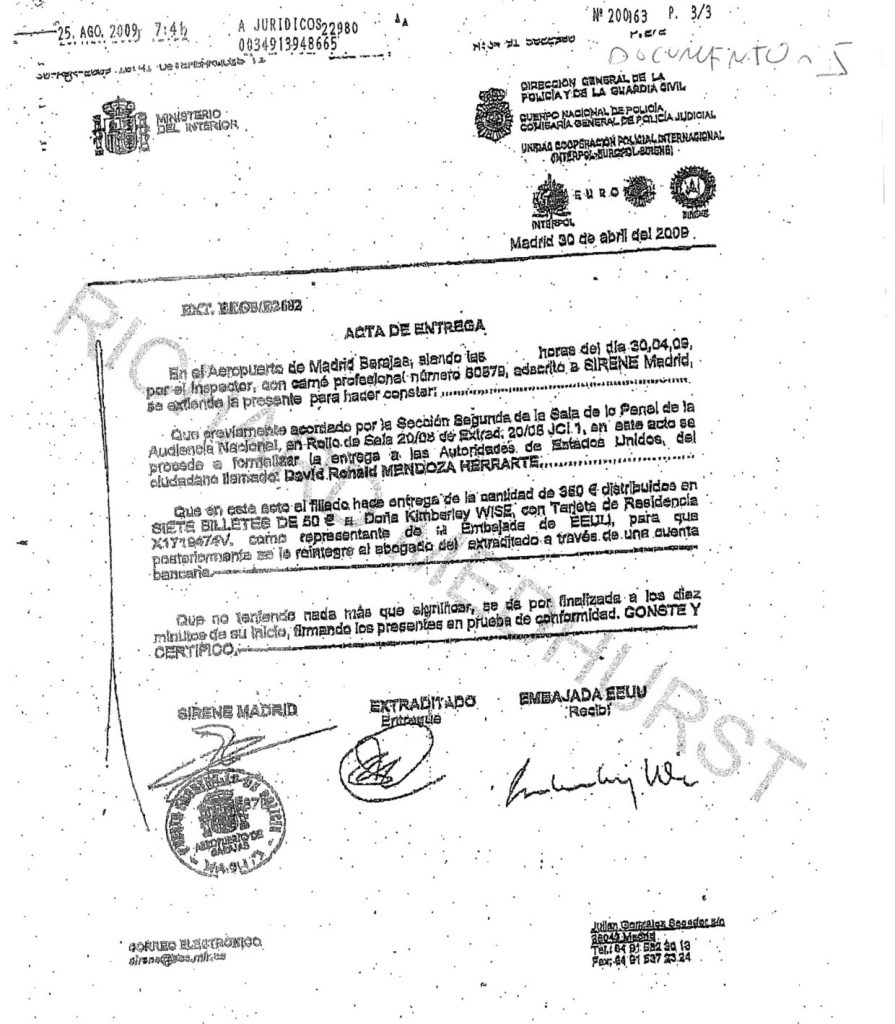
This contract was very explicit: it didn’t say only that Mendoza had been surrendered to the US authorities, it said he had been surrendered to them “in accordance with what was previously stipulated by Section Two of the National Criminal Court”. That means the US agreed to all the conditions of Mendoza’s extradition i.e., serving his sentence in Spain, no life sentence, etc.
And did the US respect the contract once Mendoza was on American soil? Absolutely not. As a matter of fact, it refused to give him a copy of the contract once he got there so he wouldn’t be able to contest non-compliance in court. They told him it was classified and, instead, gave him a copy without his signature.
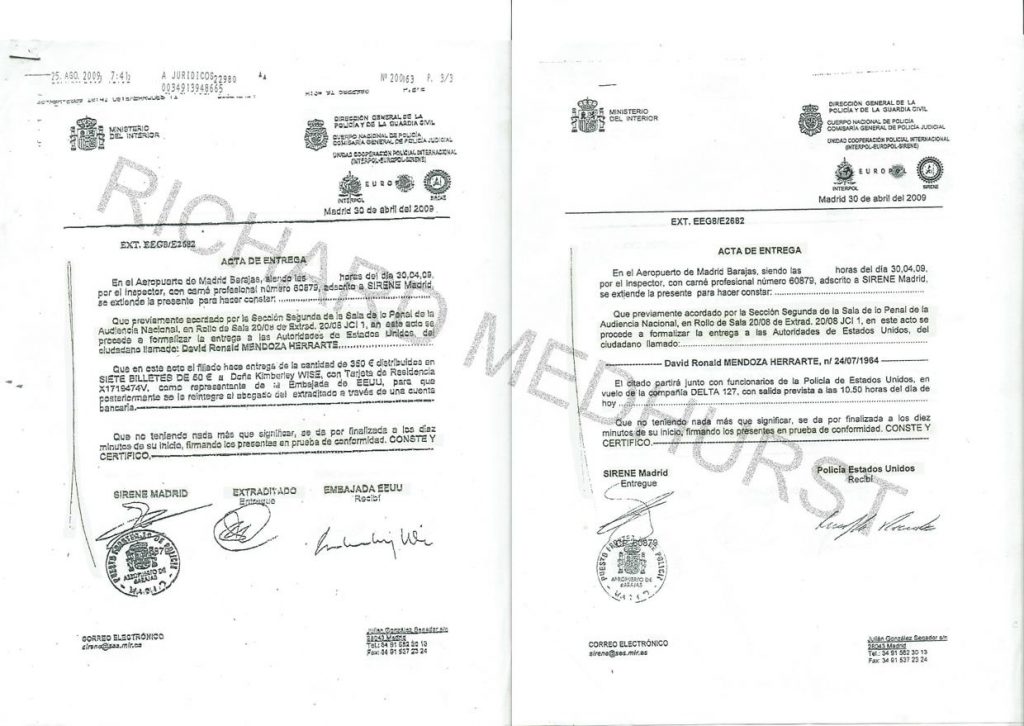
Mendoza was extradited to the US in 2009 and sentenced to 14 years. He applied three times for a treaty transfer back to Spain. Washington denied his request on every single occasion, and also told him he would have to wait two years before reapplying. I couldn’t find any mention of such a rule in the prisoner-transfer treaty.
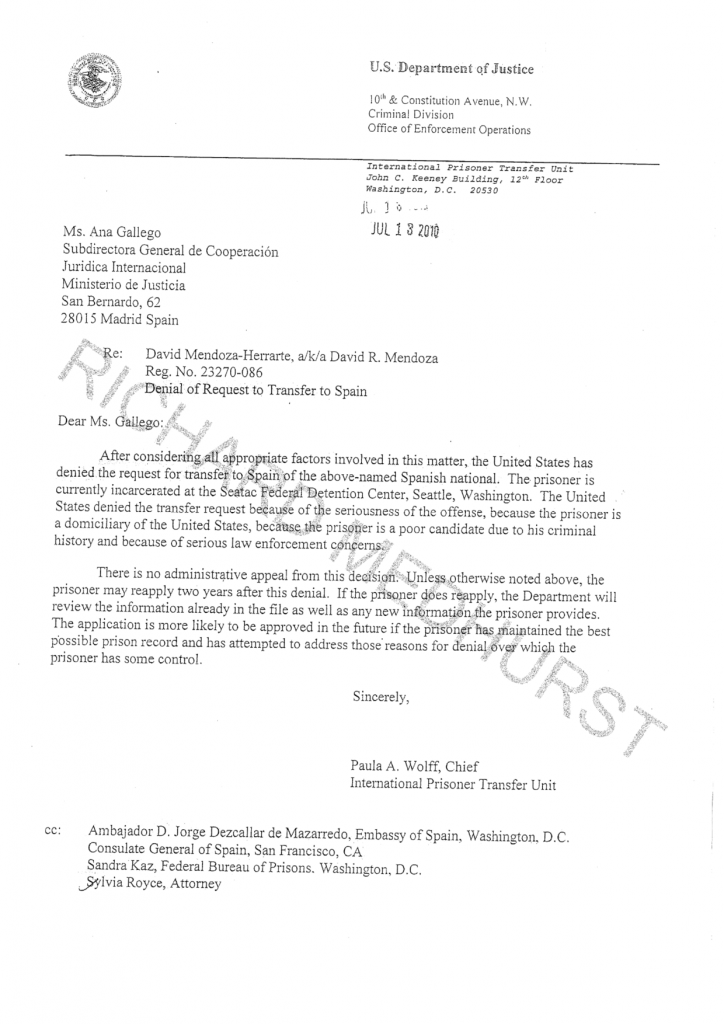
Mendoza was allowed to return to Spain in 2015 only after he sued Spain in the Spanish Supreme Court – twice – and won both times. The Supreme Court practically threatened to suspend the Spain-US extradition treaty if the Spanish government didn’t get him back. Mendoza told me this was really when Washington began to feel some pressure, because the Americans wanted to keep extraditing people to the US – having the treaty suspended would have been a legal nightmare and required getting it through the Spanish congress again and having all their dirty practices exposed.
Mendoza also sued the US Department of Justice (DoJ) for breach of contract. He was only able to do so because a Spanish judge, sympathetic to his case, sent him a copy of the original Acta de Entrega with his signature on it.
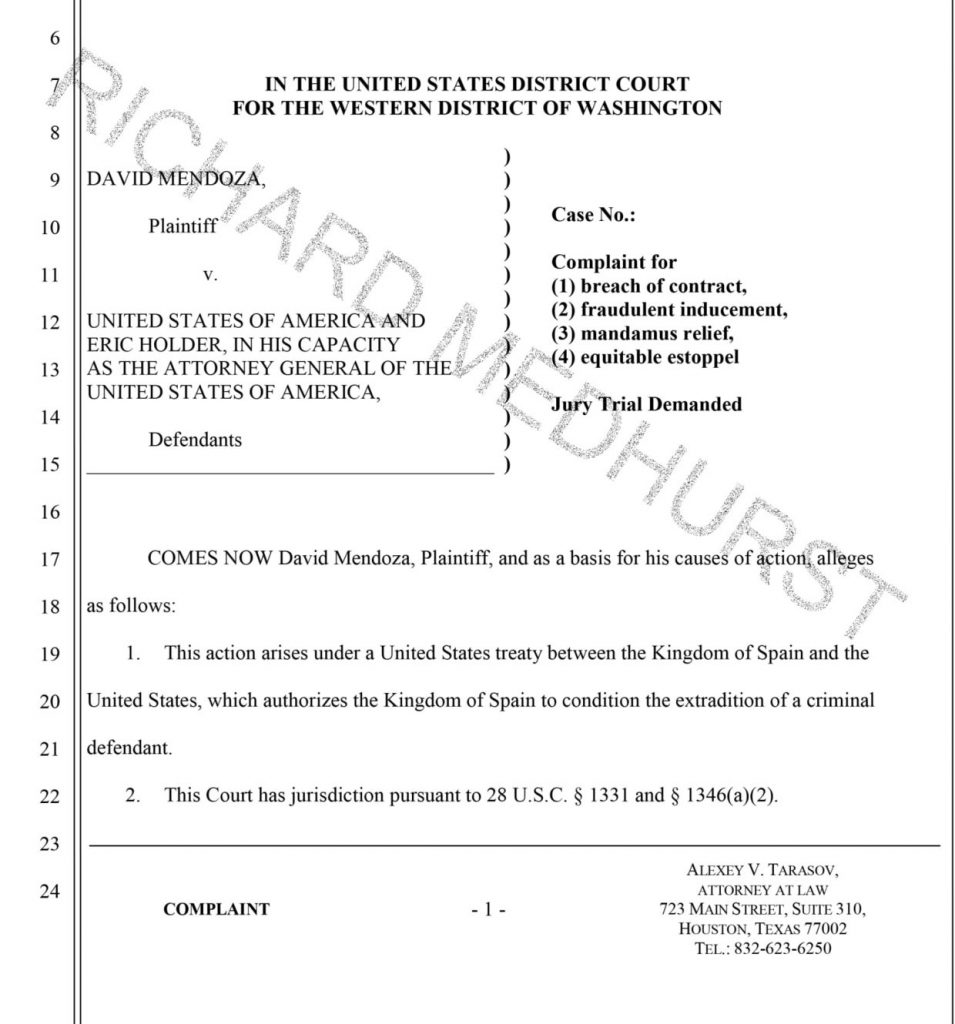
I spoke to Mendoza’s lawyer, Alexey Tarasov. He recalls how American prosecutors called him up one day and said that if his team dropped the civil suit against the DoJ, Mendoza could go back to Spain. Mendoza said having agreed to drop the suit had been the “biggest regret” of his life. He spent six years and nine months trapped in the United States. He was able to return only after suing both Spain and the US for failing to enforce the conditions of his extradition.
If Julian Assange is extradited, and Washington breaks its diplomatic assurances, what options will Assange be left with? He can’t sue the US in the civil courts. They’ll tell him: you’re not a signatory of the US-UK Extradition Treaty, so you have no claim, which is what they told Mendoza.
Assange’s other option would be to go to the UK courts. Does anyone seriously believe the British government could be compelled into pressuring the US to hold up its end of the deal and raise hell on Assange’s behalf? You can already see the results of the Special Relationship in the extradition itself.
When I spoke with Mendoza, he told me it was very important that any assurances include Assange as a party to the agreement despite his status as a non-signatory of the extradition treaty, so that, in the event of non-compliance, he can contest this in court. Moreover, he said, any transfer to Australia had to be agreed to by Australia in advance, otherwise it would be meaningless.
Mendoza was fortunate to have the Spanish public, Spanish judges and the Spanish Supreme Court applying pressure on his behalf. Otherwise, he would still be in an American prison. The United States never held up its end of the deal, and the Spanish government did virtually nothing to get him back. Mendoza told me: “I’m a nobody. If they did that to me, what are they going to do to Julian Assange?”
Mendoza’s case is now more important than ever, because it shines a light on how the United States makes false promises and cannot be held to account after the fact. When the High Court says in point 54 of Friday’s ruling that it “can be said to show that the USA may be expected to apply the strict letter of an assurance which it has given”, sure, in one sense, that’s correct. The diplomatic note sent by the US Embassy in Madrid is so purposely vague, the US could get around what it appeared to have promised.
However, in Mendoza’s case, there was an additional document: the Acta de Entrega. Diplomatic assurances can come in different forms and the Acta de Entrega is one of them – hence why the US Embassy in Madrid signed it. Did the judges even see this document? Or did they see only the vague, ambiguous verbal note sent in January 2009? That was nowhere near enough to make an accurate assessment of Mendoza’s case.
I can confirm, at the very least, that the vast majority of the documents I published have not been referenced in court in Assange’s case as of yet. Whether the judges had these documents in front of them, I don’t know. But if they did, and they still arrived at the conclusion that the US’ current assurances for Assange can be trusted, then they are terribly mistaken.
Anyone with a shred of common sense can see these assurances are worthless. Ironically, in that regard, Assange’s case isn’t all that unique. Mendoza told me about the countless Spaniards, Colombians, Mexicans and others he’s seen extradited to the US. It’s standard practice for the US to give these ambiguous assurances to game foreign judges and jurisdictions. It will play whatever games it can to get people into its jurisdiction, whether through the courts or by kidnapping and rendition, because once you’re in its grasp, there’s nothing you can do.
Read original article in RT News